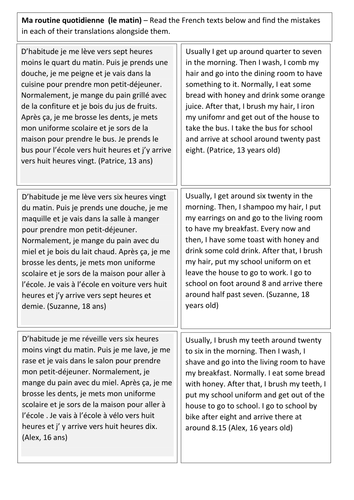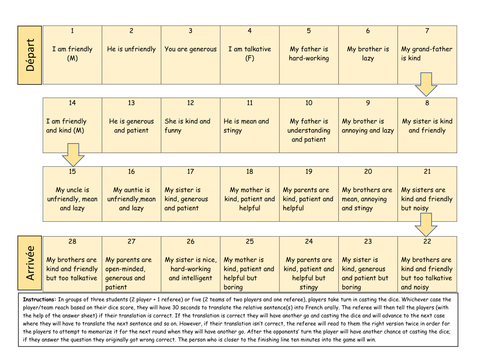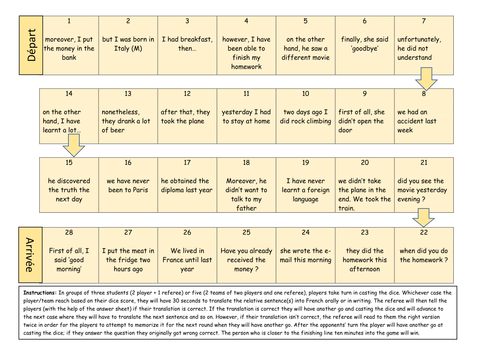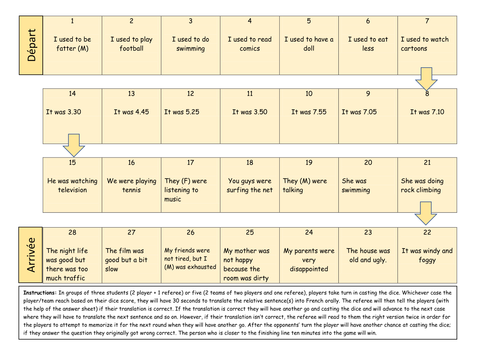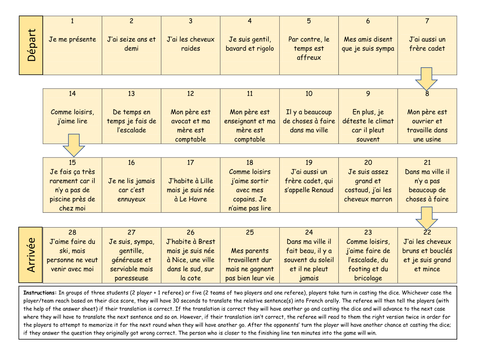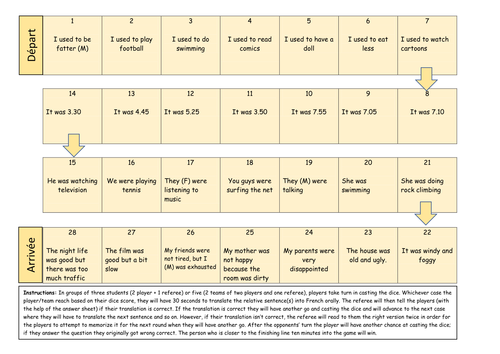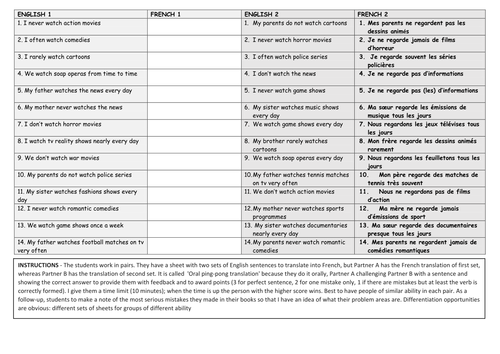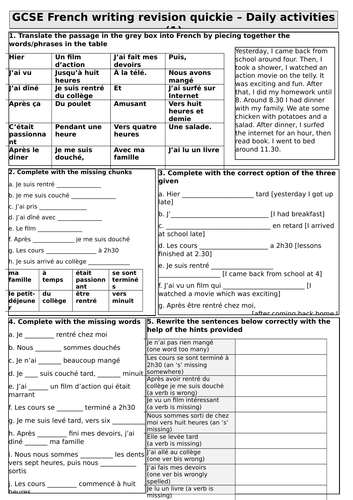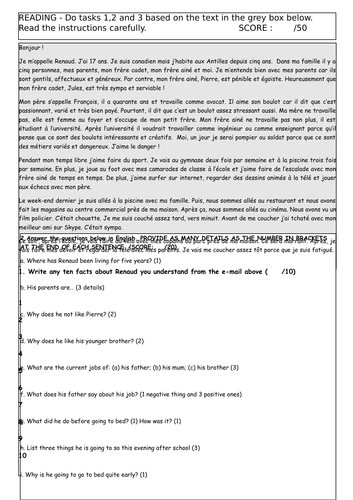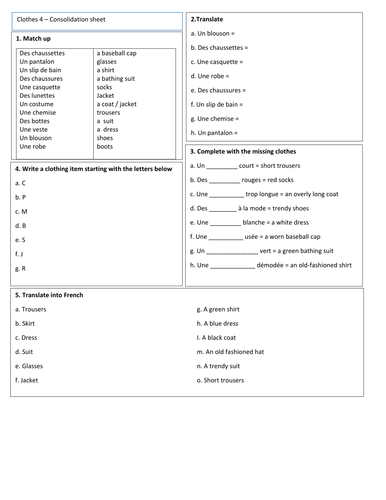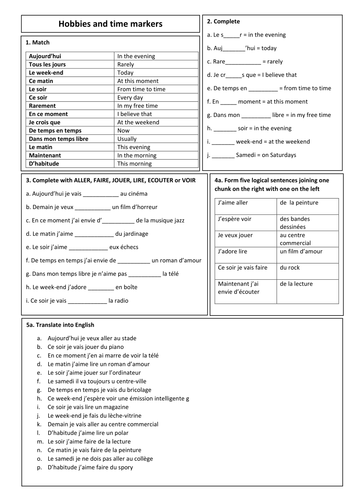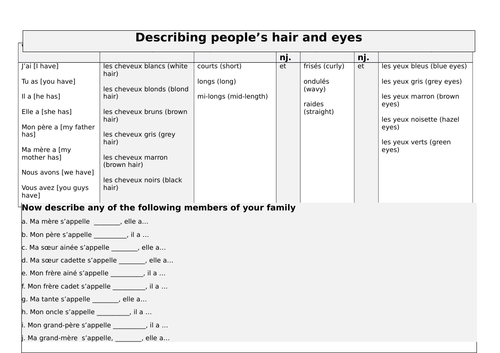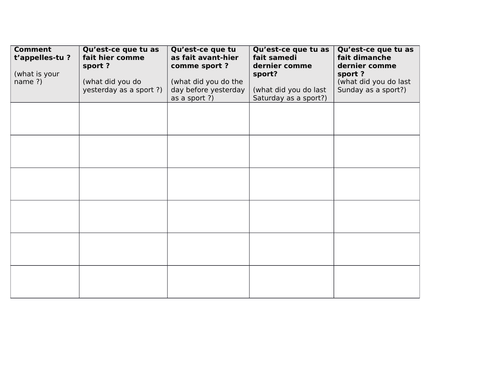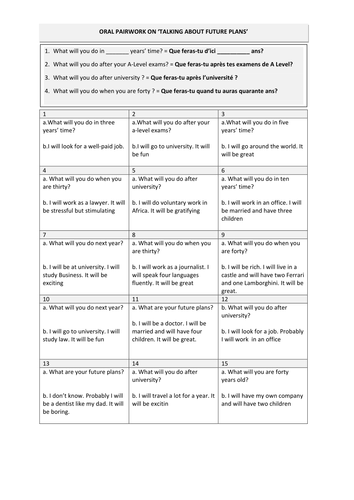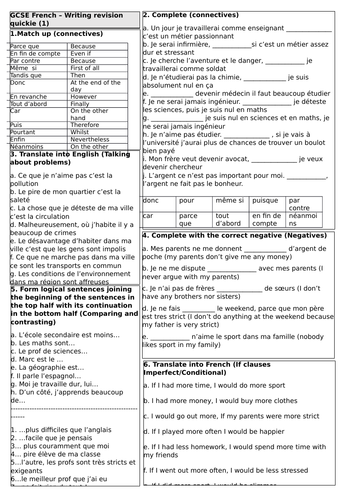
383Uploads
3148k+Views
5746k+Downloads
French

Year 7 French - Narrow readings on 5 different topics
Narrow reading texts exploited through 'bad translation', 'spot the differences' and other techniques. Ideal for beginners on:
- hobbies
- general description
- morning routine
- adjectives (personality)
- sports
To find out more on this technique click here : https://gianfrancoconti.wordpress.com/2017/07/22/eight-narrow-reading-techniques-that-will-enhance-your-students-vocabulary-and-reading-skills/

KS3/4 French - Oral or Written translation board game on character description with answer key
Instructions: In groups of three students (2 player + 1 referee) or five (2 teams of two players and one referee), players take turn in casting the dice. Whichever case the player/team reach based on their dice score, they will have 30 seconds to translate the relative sentence(s) into French orally. The referee will then tell the players (with the help of the answer sheet) if their translation is correct. If the translation is correct they will have another go and casting the dice and will advance to the next case where they will have to translate the next sentence and so on. However, if their translation isn’t correct, the referee will read to them the right version twice in order for the players to attempt to memorize it for the next round when they will have another go. After the opponents’ turn the player will have another chance at casting the dice; if they answer the question they originally got wrong correct. The person who is closer to the finishing line ten minutes into the game will win.
I do a round in writing (students write on miniwhiteboards or iPads) then one or two orally changing partners each time. Students love it but adequate prep essential.

KS3/4 French - Oral translation board game on Perfect tense of irregular verbs
Instructions: In groups of three students (2 player + 1 referee) or five (2 teams of two players and one referee), players take turn in casting the dice. Whichever case the player/team reach based on their dice score, they will have 30 seconds to translate the relative sentence(s) into French orally. The referee will then tell the players (with the help of the answer sheet) if their translation is correct. If the translation is correct they will have another go and casting the dice and will advance to the next case where they will have to translate the next sentence and so on. However, if their translation isn’t correct, the referee will read to them the right version twice in order for the players to attempt to memorize it for the next round when they will have another go. After the opponents’ turn the player will have another chance at casting the dice; if they answer the question they originally got wrong correct. The person who is closer to the finishing line ten minutes into the game will win.
I do a round in writing (students write on miniwhiteboards or iPads) then one or two orally changing partners each time. Students love it but adequate prep essential.

KS2/3 French - Oral translation board game on French basics (personal info)
Instructions: In groups of three students (2 player + 1 referee) or five (2 teams of two players and one referee), players take turn in casting the dice. Whichever case the player/team reach based on their dice score, they will have 30 seconds to translate the relative sentence(s) into French orally. The referee will then tell the players (with the help of the answer sheet) if their translation is correct. If the translation is correct they will have another go and casting the dice and will advance to the next case where they will have to translate the next sentence and so on. However, if their translation isn’t correct, the referee will read to them the right version twice in order for the players to attempt to memorize it for the next round when they will have another go. After the opponents’ turn the player will have another chance at casting the dice; if they answer the question they originally got wrong correct. The person who is closer to the finishing line ten minutes into the game will win.
I do a round of written transl and one of oral changing partners

KS4 French - Imperfect : oral translation board game with answer key
Instructions: In groups of three students (2 player + 1 referee) or five (2 teams of two players and one referee), players take turn in casting the dice. Whichever case the player/team reach based on their dice score, they will have 30 seconds to translate the relative sentence(s) into French orally. The referee will then tell the players (with the help of the answer sheet) if their translation is correct. If the translation is correct they will have another go and casting the dice and will advance to the next case where they will have to translate the next sentence and so on. However, if their translation isn’t correct, the referee will read to them the right version twice in order for the players to attempt to memorize it for the next round when they will have another go. After the opponents’ turn the player will have another chance at casting the dice; if they answer the question they originally got wrong correct. The person who is closer to the finishing line ten minutes into the game will win.
I do a round in writing (students write on miniwhiteboards or iPads) then one or two orally changing partners each time. Students love it but adequate prep essential.

KS3/4 French - Pool of resources on "je me présente" (general personal details)
Three files, all recycling exactly the same vocabulary and patterns:
1. Three narrow reading texts a la Conti with a range of comprehension and an oral task.
2. An oral translation board game from French to English to do after 1
3. A gap fill task
4. An oral scaffold on the topic recycling all of the above
5. An oral translation board game from English to French

KS3-4 French - Collection of 11 oral translation board games on various topics / grammar structures
ANSWER KEY FOR EACH GAME PROVIDED
Instructions: In groups of three students (2 player + 1 referee) or five (2 teams of two players and one referee), players take turn in casting the dice. Whichever case the player/team reach based on their dice score, they will have 30 seconds to translate the relative sentence(s) into French orally. The referee will then tell the players (with the help of the answer sheet) if their translation is correct. If the translation is correct they will have another go and casting the dice and will advance to the next case where they will have to translate the next sentence and so on. However, if their translation isn’t correct, the referee will read to them the right version twice in order for the players to attempt to memorize it for the next round when they will have another go. After the opponents’ turn the player will have another chance at casting the dice; if they answer the question they originally got wrong correct. The person who is closer to the finishing line ten minutes into the game will win.
I do a round in writing (students write on miniwhiteboards or iPads) then one or two orally changing partners each time. Students love it but adequate prep essential.

KS3/4 French - Pool of resources on talking about TV
- reading tasks on opinions about tv
- consolidation activities
- a tile puzzle
- translation practice with answer key
- a sentence builder to introduce vocabulary
- talking mats to scaffold oral interaction with follow-up narrow reading

KS3 French - Sentence builder and other resources on adjectival agreement + family
A sentence builder, a written translation board game (players writing on mini boards) and a set of oral drills. All of them recycling the same words.
Materials target only 1,2 and 3 person singular of verb to be.

KS3 French - Oral ping-pong translation: tv programmes and frequency in the present tense
INSTRUCTIONS - The students work in pairs. They have a sheet with two sets of English sentences to translate into French, but Partner A has the French translation of first set, whereas Partner B has the translation of second set. It is called 'Oral ping-pong translation' because they do it orally, Partner A challenging Partner B with a sentence and showing the correct answer to provide them with feedback and to award points (3 for perfect sentence, 2 for one mistake only, 1 if there are mistakes but at least the verb is correctly formed). I give them a time limit (10 minutes); when the time is up the person with the higher score wins. Best to have people of similar ability in each pair. As a follow-up, students to make a note of the most serious mistakes they made in their books so that I have an idea of what their problem areas are. Differentiation opportunities are obvious: different sets of sheets for groups of different ability

KS3/4 French - Oral scaffold for conversation on TV, narrow reading and oral ping pong translation
1. Talking mats (10 questions about tv habits) + narrow reading including three tenses
2. Oral ping pong translation

2 GCSE French writing quickies on : Daily activities
Two revision quickies which focus on micro-writing skills

KS3 French - Reading comprehension on jobs, opinions and free time (three tenses)
A reading comp meant for my year 7s but can be used with year 8 too. Loosely based on Expo 2 rouge

KS3 French - Describing clothes (adjectives and nouns)
A very detailed list of vocab to describe clothes and tasks to drill them in

KS3/4 Cinema - Talking about movies (sentence builder, sentence builders and reading comp)
A pool on resources on cinema

French Beginners - HOBBIES: Narrow reading, Sentence builder and Vocabulary builder
Narrow reading, Sentence builder and Vocabulary builder , very successful with my students

KS2 / 3 French - Describing hair and eyes (sentence builder)
A sentence builder to present hair and eyes description

KS3 French - Talking about hobbies in the past
Sentence builder
Consolidation
Reading comprehension
Survey

KS3/4 French - Pool of resources on future plans
A set of resources on future plans in the first person of the simple future

